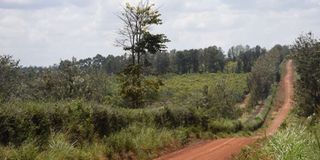Decision in Kakuzi-Makuyu Golf Club case could alter land laws

A road that passes next to Kakuzi tree plantation in Makuyu, Muranga County.
Embattled agribusiness firm Kakuzi Ltd’s protested move to graze cattle on part of a 72-acre piece of land has now become the subject of a Court of Appeal case, which is likely to result in a landmark ruling that could affect the laws governing land ownership in Kenya.
Makuyu Golf Club has, since 1934, occupied the land, and was last year declared the valid owner of the prime property, on the basis of adverse possession.
Adverse possession is a legal principal that gives full ownership rights of a specific piece of land to any individual that has occupied it for at least 12 years.
Last week, the golf Club protested a move by Kakuzi to graze cattle on the contested 72-acre piece of land in Murang’a County, arguing that the move is in violation of a court order requiring status quo in regard to the property.
Since 2002, the golf club has taken on Kakuzi in court over the land.
Declared valid owner
On September 19, 2019, High Court Judge Oscar Angote ruled that Makuyu Golf Club had occupied the land for more than 12 years uninterrupted, and declared it the valid owner.
The judge ordered that Makuyu Golf Club be registered as the legal owner of the land, a process that would involve issuance of a title deed.
But Kakuzi now claims in the Court of Appeal that Makuyu Golf Club has not exclusively used the land uninterrupted for more than 12 years, and that the agribusiness conglomerate has over the years grazed its cattle on the land.
The claim is among 11 grounds of appeal that Kakuzi has laid before the Court of Appeal, seeking to set aside Justice Angote’s decision.
“The learned judge erred in law and in fact and misdirected himself in failing to consider evidence given by Kakuzi’s witness that Kakuzi had at all times taken steps to assert its title over the suit property and the occupation of the suit property by Makuyu Golf Club was with the knowledge and consent of Kakuzi, thereby arriving at an erroneous and/or wrong decision that the use of the suit property had been continuous, exclusive and without the permission of Kakuzi,” the multinational claims in court papers.
Released cattle to graze
Last week, the gold club said Kakuzi has only released cattle to graze on the land since 2016. The golf club held that both parties agreed, at the Court of Appeal, to maintain status quo on the land.
Kakuzi maintained, in a press release, that the status quo order allowed it to continue grazing cattle on the disputed land.
The status quo order was issued by Justices Mohamed Warsame, Stephen Asike-Makhania and James Otieno-Odek after the parties agreed to it.
The three judges will now be tasked with determining whether Makuyu Golf Club’s stay on the land has had a 12-year uninterrupted period of occupation.
The decision, whichever way it goes, could affect several other land cases where adverse possession has been used as a ground for laying claim to land.
Kakuzi insists that it made steps to have the golf club recognised as a tenant on the property, and that the High Court blundered in ruling otherwise.
Makuyu Golf Club told the High Court that the land was given to it as a donation by a group of White farmers in 1934.
Paid rent
Court records indicate that the golf club initially paid rent to Makuyu Sisal, a company that owned a plantation in the area.
When Makuyu Sisal sold all its business to Kakuzi Ltd in 1967, Makuyu Golf Club stopped paying rent. It also put up permanent buildings, a golf course and a 300-metre deep borehole on the land.
Trouble started brewing in 1994 when Camellia PLC bought into Kakuzi Ltd. Kakuzi then stopped offering the support it initially gave to the golf club, such as mowing the golf course grass and supplying water from the agribusiness’ Kiboko dam.
In 2001, Kakuzi demanded that Makuyu Golf Club sign a licence to use the land, which would effectively create a landlord-tenant relationship.
Makuyu Golf Club moved to court a year later, insisting that it owns the land, and that any challenge would be extinguished by the fact that the golf club has occupied the property uninterrupted since 1934.
Justice Angote held that a letter from Kakuzi to Makuyu Golf Club written in March, 1996 was enough evidence that the golf club had enjoyed more than 12 years of uninterrupted possession.
In the letter, Kakuzi stated that it would no longer pay Makuyu Golf Club’s employees and would no longer offer any support.
“The letter of March 26, 1996 clearly shows that Kakuzi Ltd was not in occupation or possession of the golf course but was only “supporting” Makuyu Golf Club by supplying it with diesel oil, lending of tractors, lawn mowers, the payment of wages for the golf employees and maintenance of the buildings,” the judge ruled.





